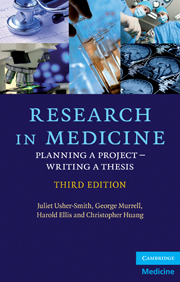Book contents
- Frontmatter
- Contents
- Preface
- 1 Introduction
- 2 Deciding whether to do research
- 3 Deciding when to do research
- 4 Selecting a research degree
- 5 Choosing a department, research supervisor and project
- 6 Applying for research positions and funding
- 7 Getting started
- 8 Overcoming frustration
- 9 Writing scientifically
- 10 Publishing a paper
- 11 Attending scientific meetings
- 12 Writing a thesis
- 13 Submitting a thesis and preparing for the viva voce examination
- Further reading
- Appendix: Information for research students wishing to study overseas
- Index
12 - Writing a thesis
Published online by Cambridge University Press: 05 May 2010
- Frontmatter
- Contents
- Preface
- 1 Introduction
- 2 Deciding whether to do research
- 3 Deciding when to do research
- 4 Selecting a research degree
- 5 Choosing a department, research supervisor and project
- 6 Applying for research positions and funding
- 7 Getting started
- 8 Overcoming frustration
- 9 Writing scientifically
- 10 Publishing a paper
- 11 Attending scientific meetings
- 12 Writing a thesis
- 13 Submitting a thesis and preparing for the viva voce examination
- Further reading
- Appendix: Information for research students wishing to study overseas
- Index
Summary
Timing
Most students will reach a compromise between two extreme approaches to timing when it comes to writing up a thesis. You could start writing your dissertation only after completing all your experimental work, or could write a sequence of short accounts in the course of your project as you gather results and draw conclusions. Writing periodic progress reports and papers as circumscribed parts of your project become completed can form part of this process.
Writing continuously as you collect data has a number of advantages. It reduces the amount of pressure on you as you approach your thesis deadline, and encourages the good habit of reviewing and analysing data soon after they are obtained. The act of writing then becomes an integral part of your thinking about your data, dealing with inconsistencies, and identifying forgotten control experiments. These can then be rectified in the course of your continued laboratory work. In any case, writing as you go helps fill in periods where you are unable to do experiments; for example, when equipment is being serviced or repaired. Observing your dissertation as it gradually evolves, rather than anticipating the massive task of writing it, builds morale. Additionally, working some of your findings into publications will improve your chances of obtaining your next job, as then you will have something to show for your work. Finally, the time at which you decide to stop laboratory work and devote your time entirely to writing becomes less critical.
- Type
- Chapter
- Information
- Research in MedicinePlanning a Project – Writing a Thesis, pp. 103 - 116Publisher: Cambridge University PressPrint publication year: 2010



